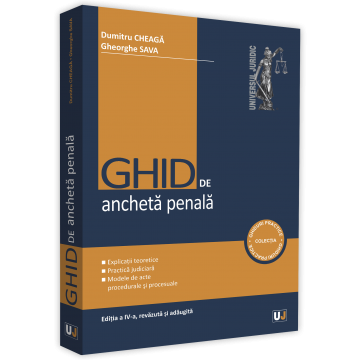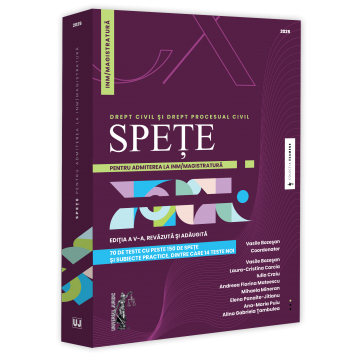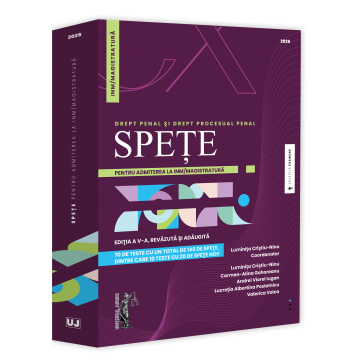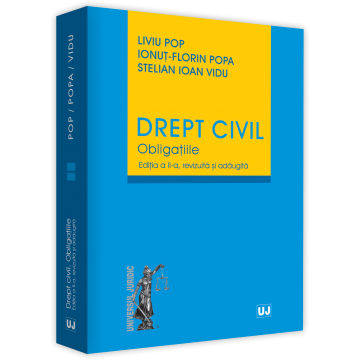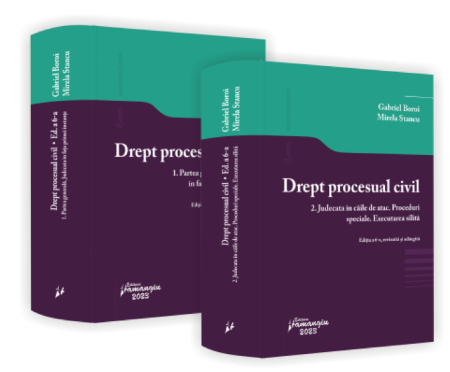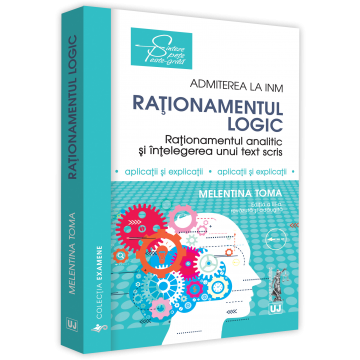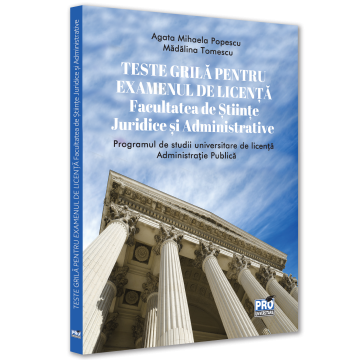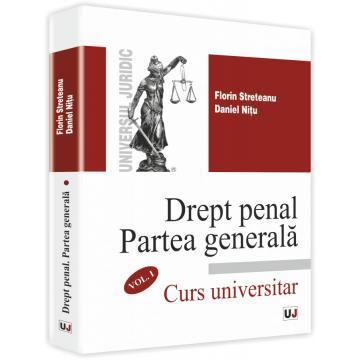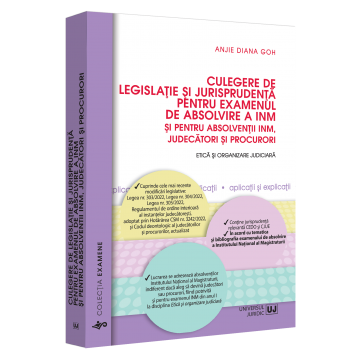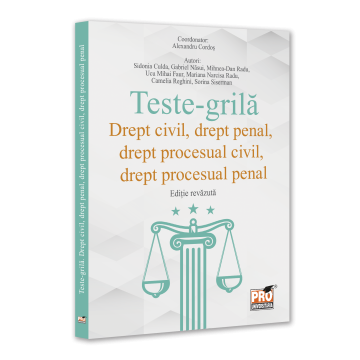Manuscript proposals: [email protected] / 0745 204 115 //// Tracking orders Individuals / Sales: 0745 200 357 / Orders Legal entities: 0721 722 783
ISBN: 978-606-28-1417-5
DOI: https://doi.org/10.5682/9786062814175
Publisher year: 2022
Edition: I
Pages: 110
Publisher: Editura Universitară
Author: Nicolae Ploesteanu, Raul Miron
Product Code:
9786062814175
Do you need help?
0745 200 357
- Description
- Download (1)
- Authors
- Content
- More details
- Reviews (0)
International liability is a field of public international law, characterized by a series of typologies and sanctioning forms that may occur as a result of a violation of a legal norm. This field, from a scientific point of view, is characterized only by analysis and design, because the existing reality in international relations does not allow a predictability and precision of the sanction that will be applied for the violation of a concrete rule. However, knowledge of the main rules and possible sanctions is useful in the practice of international relations because it allows the adoption of concrete directions of action within a specific framework.
The handbook is based in particular on the work of the United Nations Commission on International Law and relevant handbooks in the field, which contain basic references in the field of international liability by recognized doctrinaires.
Being a textbook, it was preferred to exclude constant citations in order to give simplicity and allow the easy assimilation of notions by students and, finally, to indicate the bibliography used and which we consider relevant, because most of us I guided by "the doctrine of the most prestigious and recognized authors of international law."
The handbook mainly reflects the position of the United Nations Commission, with James Crawford as its main rapporteur, and when I considered it necessary to add one, I did so. I also found Anthony Aust's simple but practical approach to state responsibility useful.
The textbook contains both a part of the theory, in summary, as well as verification questions of the students and, finally, it gives a relevant case from the practice of the International Court of Justice, in the field of international liability. As a result, I consider it a useful and necessary means for a thorough basic training in the field of international responsibility, and may even be useful for verifying the basic knowledge of candidates for positions in the public system for which it is necessary to understand international relations.
All the ideas in the textbook, from recognized authors, were personally verified by the author by the method of debate and the simulated process system.
I followed an English model of rendering some main terms, such as State, Responsibility, International, etc., from case to case, because the contextual idea appears much more illustrative. As a result, it is not English that is the origin of this pattern, but the implicit pedagogy of the Handbook.
Regarding terminology and drafting, it is initially necessary to make certain clarifications. Throughout the paper I have often used close but different terms for the same concept or for the same paper. Thus, especially when we talk about the norms in the field of international liability of the States, we used various terminologies, but with a certain logic. ARSIWA is the acronym for the universally accepted wording of the article entitled "Articles on Responsibility of States for Internationally Wrongful Acts". This document is the basis of the current Handbook. The translation into Romanian raises certain difficulties, because there is no linguistic normative correspondent for each of the specific concepts. As a result, this document has been translated word for word: Articles on State Liability for Illicit International Acts. Obviously, for reasons of efficiency and simplification, this document appears in the text of the manual either called ARSIWA or, in short, the Articles. However, sometimes the context required us to refer to the work prior to the adoption by the UN General Assembly of the document entitled ARSIWA; in this case, the document was in draft form and was prepared by the International Law Commission. As a result, the same document will be found in the Handbook, sometimes referred to as the Draft Articles or the Draft International Law Commission. On this singular terminology, I remind you that the variety of forms (ARSIWA, Draft International Law Commission, Articles) is adapted to the context in which they appear, even if they reflect the content of the same document.
Regarding the drafting of the Manual, some clarifications are required. The main documentation comes from English and its main utility will be made in a context that, for the time being, is most often stated in English. For this reason, whenever I considered that an actor of international law, in essence the “state”, should be highlighted, in order to highlight him I resorted to an editorial strategy that does not correspond to the Romanian grammar; thus, even if it did not appear at the beginning of the sentence, the sentence, I passed the "state" with the initial capital letter: "The state". Also, referring to ARSIWA, I made the statements in the sentence itself, such as "Articles", that is, a capitalized abbreviation of the wording "Articles on State Liability for Illicit International Acts."
A challenge was to express in Romanian terms whose meaning is expressed exclusively in English, the language that is most used in the work of the International Law Commission. Here, the student must evaluate very carefully, because otherwise he can only understand the meaning of some expressions at seminars or courses. In particular, the central wording "illegal international act" is in contradiction with the wording of the usual doctrine of Romanian law, because it includes both what is known as "acts" and "facts". This terminology, found in international law, is specific. Moreover, in international law, when we affirm the existence of an "act" we have in mind both the hypothesis of an action and the hypothesis of an inaction. Turning to another story about English terminology, I think it's important to remember from the beginning that the main papers available to us are written in English, so adapting the concepts, written in English, to the understanding of Romanian students, required a constant evaluation and a constant adaptation, which has as reflections, within the Manual, certain diversifications. Thus, by way of example, I mention here the concept of "Compensation" in English, whose correspondent in Romanian may differ and cause confusion: compensation or compensation? Is the same thing? I have often used basic terminology in various forms, even if it has the same meaning, to accustom the student to this one-size-fits-all situation. Here's another example: "repair" or "repair"? It depends on the context, but the meaning is the same. The most important mention of the language used is the term "imputability"; In this case, it is constantly mentioned as such, but in Romanian it would have been much easier to understand if the term "attributable" had been used. I preferred to stay on the authentic linguistic line, but the student who reads the textbook must think about that meaning of the term "imputability", that of attributing a certain conduct to an entity.
I do not refrain from stating that I was part of a student circle called ius iuventutis, which elaborated a great deal without owning intellectual property rights, especially being public through a circle blog. The blog materials belong to us and reflect the activity of the student circle. If anyone wants to understand more, in Romanian, about international law, I recommend you study the materials of this blog.
Finally, it is important to know that for over 18 years I have trained students at the university where I work according to the concept of this Handbook, verifying and re-verifying each sentence and each concept, even if they are mostly stated in the specialized doctrine. and are extremely well stated in the Comments on the Draft Articles on the International Liability of States.
I have included at the end of the textbook, similar to the Handbook of Treaty Law, a case of the International Court of Justice, namely Costa Rica v. Nicaragua - only a case for reparations. We considered it by far the most relevant in the field of liability, because it illustrates both the concepts of general international law of international liability and progressive concepts, illustrated extremely stylishly in separate opinions, concordant or dissenting, in the final decision. In addition, it is the first decision to assign responsibility for violating environmental law. I highly recommend reading it.
"The textbook raises a delicate issue, which has so far been resolved, but will be reiterated in the future: can a state impose a sanction that signifies the idea of a punishment for violating international law? Or should that sanction be imposed, just to set an example, in the international society of the states, so that those tempted to commit a similar act in the future will have a detention? ” For the time being, general international law excludes the idea of punitive or model sanctions, but this idea appears more and more frequently in international theoretical and diplomatic approaches.
The handbook is based in particular on the work of the United Nations Commission on International Law and relevant handbooks in the field, which contain basic references in the field of international liability by recognized doctrinaires.
Being a textbook, it was preferred to exclude constant citations in order to give simplicity and allow the easy assimilation of notions by students and, finally, to indicate the bibliography used and which we consider relevant, because most of us I guided by "the doctrine of the most prestigious and recognized authors of international law."
The handbook mainly reflects the position of the United Nations Commission, with James Crawford as its main rapporteur, and when I considered it necessary to add one, I did so. I also found Anthony Aust's simple but practical approach to state responsibility useful.
The textbook contains both a part of the theory, in summary, as well as verification questions of the students and, finally, it gives a relevant case from the practice of the International Court of Justice, in the field of international liability. As a result, I consider it a useful and necessary means for a thorough basic training in the field of international responsibility, and may even be useful for verifying the basic knowledge of candidates for positions in the public system for which it is necessary to understand international relations.
All the ideas in the textbook, from recognized authors, were personally verified by the author by the method of debate and the simulated process system.
I followed an English model of rendering some main terms, such as State, Responsibility, International, etc., from case to case, because the contextual idea appears much more illustrative. As a result, it is not English that is the origin of this pattern, but the implicit pedagogy of the Handbook.
Regarding terminology and drafting, it is initially necessary to make certain clarifications. Throughout the paper I have often used close but different terms for the same concept or for the same paper. Thus, especially when we talk about the norms in the field of international liability of the States, we used various terminologies, but with a certain logic. ARSIWA is the acronym for the universally accepted wording of the article entitled "Articles on Responsibility of States for Internationally Wrongful Acts". This document is the basis of the current Handbook. The translation into Romanian raises certain difficulties, because there is no linguistic normative correspondent for each of the specific concepts. As a result, this document has been translated word for word: Articles on State Liability for Illicit International Acts. Obviously, for reasons of efficiency and simplification, this document appears in the text of the manual either called ARSIWA or, in short, the Articles. However, sometimes the context required us to refer to the work prior to the adoption by the UN General Assembly of the document entitled ARSIWA; in this case, the document was in draft form and was prepared by the International Law Commission. As a result, the same document will be found in the Handbook, sometimes referred to as the Draft Articles or the Draft International Law Commission. On this singular terminology, I remind you that the variety of forms (ARSIWA, Draft International Law Commission, Articles) is adapted to the context in which they appear, even if they reflect the content of the same document.
Regarding the drafting of the Manual, some clarifications are required. The main documentation comes from English and its main utility will be made in a context that, for the time being, is most often stated in English. For this reason, whenever I considered that an actor of international law, in essence the “state”, should be highlighted, in order to highlight him I resorted to an editorial strategy that does not correspond to the Romanian grammar; thus, even if it did not appear at the beginning of the sentence, the sentence, I passed the "state" with the initial capital letter: "The state". Also, referring to ARSIWA, I made the statements in the sentence itself, such as "Articles", that is, a capitalized abbreviation of the wording "Articles on State Liability for Illicit International Acts."
A challenge was to express in Romanian terms whose meaning is expressed exclusively in English, the language that is most used in the work of the International Law Commission. Here, the student must evaluate very carefully, because otherwise he can only understand the meaning of some expressions at seminars or courses. In particular, the central wording "illegal international act" is in contradiction with the wording of the usual doctrine of Romanian law, because it includes both what is known as "acts" and "facts". This terminology, found in international law, is specific. Moreover, in international law, when we affirm the existence of an "act" we have in mind both the hypothesis of an action and the hypothesis of an inaction. Turning to another story about English terminology, I think it's important to remember from the beginning that the main papers available to us are written in English, so adapting the concepts, written in English, to the understanding of Romanian students, required a constant evaluation and a constant adaptation, which has as reflections, within the Manual, certain diversifications. Thus, by way of example, I mention here the concept of "Compensation" in English, whose correspondent in Romanian may differ and cause confusion: compensation or compensation? Is the same thing? I have often used basic terminology in various forms, even if it has the same meaning, to accustom the student to this one-size-fits-all situation. Here's another example: "repair" or "repair"? It depends on the context, but the meaning is the same. The most important mention of the language used is the term "imputability"; In this case, it is constantly mentioned as such, but in Romanian it would have been much easier to understand if the term "attributable" had been used. I preferred to stay on the authentic linguistic line, but the student who reads the textbook must think about that meaning of the term "imputability", that of attributing a certain conduct to an entity.
I do not refrain from stating that I was part of a student circle called ius iuventutis, which elaborated a great deal without owning intellectual property rights, especially being public through a circle blog. The blog materials belong to us and reflect the activity of the student circle. If anyone wants to understand more, in Romanian, about international law, I recommend you study the materials of this blog.
Finally, it is important to know that for over 18 years I have trained students at the university where I work according to the concept of this Handbook, verifying and re-verifying each sentence and each concept, even if they are mostly stated in the specialized doctrine. and are extremely well stated in the Comments on the Draft Articles on the International Liability of States.
I have included at the end of the textbook, similar to the Handbook of Treaty Law, a case of the International Court of Justice, namely Costa Rica v. Nicaragua - only a case for reparations. We considered it by far the most relevant in the field of liability, because it illustrates both the concepts of general international law of international liability and progressive concepts, illustrated extremely stylishly in separate opinions, concordant or dissenting, in the final decision. In addition, it is the first decision to assign responsibility for violating environmental law. I highly recommend reading it.
"The textbook raises a delicate issue, which has so far been resolved, but will be reiterated in the future: can a state impose a sanction that signifies the idea of a punishment for violating international law? Or should that sanction be imposed, just to set an example, in the international society of the states, so that those tempted to commit a similar act in the future will have a detention? ” For the time being, general international law excludes the idea of punitive or model sanctions, but this idea appears more and more frequently in international theoretical and diplomatic approaches.
-
The International Responsibility of States
Download
NICOLAE PLOESTEANU
RAUL MIRON
RAUL MIRON
CONTEXTUAL REFERENCES / 7
I. INTRODUCTION AND SPECIFIC CONCEPTS / 11
II. WHY IS INTERNATIONAL RESPONSIBILITY PRESENT? / 14
III. STATE RESPONSIBILITY: THE CLASSIFICATION AND CHARACTERIZATION PROBLEM / 18
A. Liability under international or national law? / 18
B. Typology of state liability / 20
C. ARSIWA's relationship with other international rules / 23
IV. ELEMENTS OF STATE RESPONSIBILITY / 26
A. The imputability of a conduct in charge of the state / 26
B. Violation of an obligation by a state / 31
1. Guilt and prejudice / 33
2. The rule of application of international law in time. Intertemporality / 34
3. Violation of international obligations having as source a composite act / 36
C. Circumstances that remove the illicit character: defenses or exonerating causes of liability / 37
1. Consent / 38
2. Legitimate defense / 39
3. Countermeasures / 39
4. Strong major / 40
5. State of danger and state of necessity / 40
6. The consequences of invoking the circumstances that remove the illicit character / 42
V. CONTENT OF INTERNATIONAL RESPONSIBILITY / 43
A. Termination and non-repetition of the act / 43
B. Repair / 44
1. Forms of repair / 45
2. Refund / 46
3. Compensation / 47
4. Satisfaction / 48
C. Other consequences and practical aspects of international responsibility: the attitude of the injured state and other states / 49
D. A brief look at the European Union / 51
VI. CONCLUSIONS: THE FUTURE DEVELOPMENT OF INTERNATIONAL LIABILITY LAW / 54
ARE YOU COMING. SUBJECTS FOR STUDENT EXAMINATION / 55
BIBLIOGRAPHY / 65
ARTICLES ON STATE RESPONSIBILITY FOR ILLEGAL ACTS / 68
SUMMARY OF THE JUDGMENT OF THE INTERNATIONAL COURT OF JUSTICE 2018/1/81
I. INTRODUCTION AND SPECIFIC CONCEPTS / 11
II. WHY IS INTERNATIONAL RESPONSIBILITY PRESENT? / 14
III. STATE RESPONSIBILITY: THE CLASSIFICATION AND CHARACTERIZATION PROBLEM / 18
A. Liability under international or national law? / 18
B. Typology of state liability / 20
C. ARSIWA's relationship with other international rules / 23
IV. ELEMENTS OF STATE RESPONSIBILITY / 26
A. The imputability of a conduct in charge of the state / 26
B. Violation of an obligation by a state / 31
1. Guilt and prejudice / 33
2. The rule of application of international law in time. Intertemporality / 34
3. Violation of international obligations having as source a composite act / 36
C. Circumstances that remove the illicit character: defenses or exonerating causes of liability / 37
1. Consent / 38
2. Legitimate defense / 39
3. Countermeasures / 39
4. Strong major / 40
5. State of danger and state of necessity / 40
6. The consequences of invoking the circumstances that remove the illicit character / 42
V. CONTENT OF INTERNATIONAL RESPONSIBILITY / 43
A. Termination and non-repetition of the act / 43
B. Repair / 44
1. Forms of repair / 45
2. Refund / 46
3. Compensation / 47
4. Satisfaction / 48
C. Other consequences and practical aspects of international responsibility: the attitude of the injured state and other states / 49
D. A brief look at the European Union / 51
VI. CONCLUSIONS: THE FUTURE DEVELOPMENT OF INTERNATIONAL LIABILITY LAW / 54
ARE YOU COMING. SUBJECTS FOR STUDENT EXAMINATION / 55
BIBLIOGRAPHY / 65
ARTICLES ON STATE RESPONSIBILITY FOR ILLEGAL ACTS / 68
SUMMARY OF THE JUDGMENT OF THE INTERNATIONAL COURT OF JUSTICE 2018/1/81
In any legal field, including that of international law, liability is a necessary corollary of the (legal) obligation. Any breach of its obligations by a subject of international law commits international liability. This means that the international reality, which includes among the main actors both the States and the International Organizations, records the idea of responsibility, even if the main subjects of responsibility are the States. The handbook reviews the various forms of international liability and presents the general features of state responsibility, due to the historical primacy of states in the system of international law, an area that makes up the law of state responsibility. To understand the field, an initial distinction must be made: it does not highlight the content of international obligations whose non-compliance leads to international liability, but the subsequent sequence, namely, once the international obligation is violated we must know the consequences. As a result, in theory, the typology of a sanction, be it territorial, financial, diplomatic or otherwise, has nothing to do with the nature of the breached obligation. Another important mention is that the rules presented are general, but are related to States and can only be extended to International Organizations, with caution, due to the specifics of international law: in the end, the responsibility lies with the final actors! This does not mean the exclusion of the international liability of International Organizations, but it will follow the already known rules in the field of State liability, where the custom has been highlighted. However, the international liability of organizations is a less developed field, compared to the responsibility of States and, therefore, is considered only incidentally, as is the possible liability of other international actors under public international law. However, as a relevant example, after the terrorist events of September 11, 2001, it was sought to theorize the doctrine that in international law other actors than States are responsible, such as terrorist groups; This doctrine, strongly supported even today, has no scientific basis, but is strongly supported by the practice of States and international organizations.
The law of State liability regulates the consequences of a State's violation of one or more international obligations and establishes the permitted reactions to such a violation, ie the obligations of that State which has committed an unlawful international act, on the one hand, and its rights and possibilities. any State affected by unlawful acts, on the other hand. It is clear that we are referring to a specific field of law and, even more so, of public international law. The handbook highlights in particular the constitutive elements of the responsibility of the states, as well as the possible exonerating causes which, when present, remove the responsibility of the state, which did not have a conduct in accordance with the obligations it has assumed.
The Handbook also presents various consequences, especially the Obligations that are generated by the commission of an illegal international act, and especially the Obligation to repair the damage, in all its forms.
One of the essential components of the Handbook, presented in the final sequence of the issue of international liability, is to understand the situation in which a State is entitled to invoke a cause of violation of international law and, if necessary, to request the cessation of the violation. ) to the international obligations generated by the violation or to order the taking of countermeasures.
Regarding the content of the rules presented and the Handbook, an important distinction is that, like the Handbook of International Treaty Law, we must keep in mind that the rules of liability come as a "support" for the actions or inactions of States or international organizations. the sense that it "draws" to these entities the consequences of their activity. What does this statement mean?
Here we relate the essence of the most delicate issue in international law: in June 1914, a state (meaning through its agents!), Motivated by an appropriate context, sent a message to other states, announcing a fight ending only Control and revenge being initially excluded; this Message led to the worst war - the World War - and the First in its category. Naturally, today, the year 2021, countries such as Austria, Germany and, why not, Turkey or Russia, or Bulgaria, are trying to recover what, in principle, cannot be recovered: History! The sanction of the violation by all participants in the first great world conflagration of complex international obligations, established by different treaties and customs, was the death of over 10 million people, in conditions that are currently difficult to accept. This means that an international sanction is always represented in internal consequences, on the sanctioned State. International liability is not just a legal concept but a historical concept! However, after a while, the negligence of the international prosecution of those States that have violated their international obligations may be categorized as assuming the usual state of affairs. It should be noted that such an assumption occurs over an extremely long period, such as one, two or more centuries. The principle underlying this reasoning is highly debatable, but it exists: Ex factis jus oritur, which means that some consequences of the actions taken by a state or anyone else could lead to the emergence of a rule of law. Social and economic evolution leads to the remedy of historical illegalities and inequalities. Unfortunately, it still takes an extremely long time.
For the correct understanding of the manual, it is useful to present the meaning of the notions listed below, the meaning being corresponding to that assigned by the International Law Commission.
International obligation - an obligation due, under international law, by one State to another State and qualified as a "primary obligation";
Primary rules - rules of international law which determine whether there has been a breach of a primary obligation;
Secondary rules - rules of international law that determine whether a breach of a primary obligation is attributable to a State, as well as the legal consequences; these rules constitute the right of liability of states;
Illegal international act - a violation of the state affected by new primary obligations that is attributable to a state;
Damage - the effect of an unlawful international act on another State or on the nationals of that State, being caused by any kind of damage, material or moral;
Impaired State - The State Affected by Injury;
Responsible or responsible state - The state that caused or is considered to be the one that caused the damage;
Act - any act or fact, consisting either in an action or in an inaction (omission);
The law of State liability regulates the consequences of a State's violation of one or more international obligations and establishes the permitted reactions to such a violation, ie the obligations of that State which has committed an unlawful international act, on the one hand, and its rights and possibilities. any State affected by unlawful acts, on the other hand. It is clear that we are referring to a specific field of law and, even more so, of public international law. The handbook highlights in particular the constitutive elements of the responsibility of the states, as well as the possible exonerating causes which, when present, remove the responsibility of the state, which did not have a conduct in accordance with the obligations it has assumed.
The Handbook also presents various consequences, especially the Obligations that are generated by the commission of an illegal international act, and especially the Obligation to repair the damage, in all its forms.
One of the essential components of the Handbook, presented in the final sequence of the issue of international liability, is to understand the situation in which a State is entitled to invoke a cause of violation of international law and, if necessary, to request the cessation of the violation. ) to the international obligations generated by the violation or to order the taking of countermeasures.
Regarding the content of the rules presented and the Handbook, an important distinction is that, like the Handbook of International Treaty Law, we must keep in mind that the rules of liability come as a "support" for the actions or inactions of States or international organizations. the sense that it "draws" to these entities the consequences of their activity. What does this statement mean?
Here we relate the essence of the most delicate issue in international law: in June 1914, a state (meaning through its agents!), Motivated by an appropriate context, sent a message to other states, announcing a fight ending only Control and revenge being initially excluded; this Message led to the worst war - the World War - and the First in its category. Naturally, today, the year 2021, countries such as Austria, Germany and, why not, Turkey or Russia, or Bulgaria, are trying to recover what, in principle, cannot be recovered: History! The sanction of the violation by all participants in the first great world conflagration of complex international obligations, established by different treaties and customs, was the death of over 10 million people, in conditions that are currently difficult to accept. This means that an international sanction is always represented in internal consequences, on the sanctioned State. International liability is not just a legal concept but a historical concept! However, after a while, the negligence of the international prosecution of those States that have violated their international obligations may be categorized as assuming the usual state of affairs. It should be noted that such an assumption occurs over an extremely long period, such as one, two or more centuries. The principle underlying this reasoning is highly debatable, but it exists: Ex factis jus oritur, which means that some consequences of the actions taken by a state or anyone else could lead to the emergence of a rule of law. Social and economic evolution leads to the remedy of historical illegalities and inequalities. Unfortunately, it still takes an extremely long time.
For the correct understanding of the manual, it is useful to present the meaning of the notions listed below, the meaning being corresponding to that assigned by the International Law Commission.
International obligation - an obligation due, under international law, by one State to another State and qualified as a "primary obligation";
Primary rules - rules of international law which determine whether there has been a breach of a primary obligation;
Secondary rules - rules of international law that determine whether a breach of a primary obligation is attributable to a State, as well as the legal consequences; these rules constitute the right of liability of states;
Illegal international act - a violation of the state affected by new primary obligations that is attributable to a state;
Damage - the effect of an unlawful international act on another State or on the nationals of that State, being caused by any kind of damage, material or moral;
Impaired State - The State Affected by Injury;
Responsible or responsible state - The state that caused or is considered to be the one that caused the damage;
Act - any act or fact, consisting either in an action or in an inaction (omission);
If you want to express your opinion about this product you can add a review.
write a review

6359.png)
![The International Responsibility of States - Nicolae Ploesteanu, Raul Miron [1] The International Responsibility of States - Nicolae Ploesteanu, Raul Miron [1]](https://gomagcdn.ro/domains/editurauniversitara.ro/files/product/large/plowstenu-miron_raspunderea-internat-a-statelor_bt-5713-6948.jpg)
